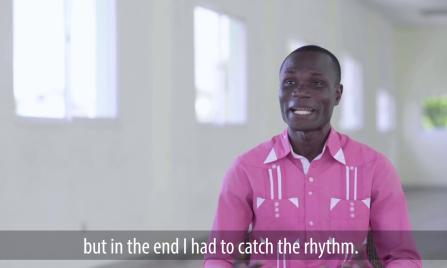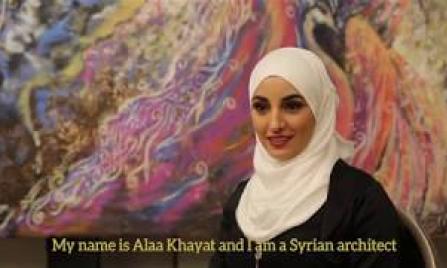-
Who we are
WHO WE AREThe International Organization for Migration (IOM) is part of the United Nations System as the leading inter-governmental organization promoting since 1951 humane and orderly migration for the benefit of all, with 175 member states and a presence in 171 countries.
-
Our Work
Our WorkAs the leading inter-governmental organization promoting since 1951 humane and orderly migration, IOM plays a key role to support the achievement of the 2030 Agenda through different areas of intervention that connect both humanitarian assistance and sustainable development.
What We Do
What We Do
Partnerships
Partnerships
- Where we work
-
Take Action
Take Action
Work with us
Work with us
Get involved
Get involved
- Data and Research
- 2030 Agenda
IOM views integration as an essential component of effective and comprehensive migration management to promote social inclusion and good relations across diverse groups, thereby contributing towards diverse yet inclusive and cohesive societies. While integration is highly contextual and varies across countries, IOM recognizes that successful integration is a dynamic and multi-directional process that involves mutual adaptation of migrants and of the host society, based on principles of protection of fundamental rights, respect, tolerance and non-discrimination. It is a multi-dimensional issue that covers migrant’s inclusion in economic, psychological, social, linguistic, navigational, and civic spheres, as well as empowering host communities and other local actors to receive and engage with migrants.
In line with the 2030 Agenda on Sustainable Development and the Global Compact for Safe, Orderly and Regular Migration (GCM), IOM’s global programming on integration takes a “whole-of-community” approach and covers critical phases of the migration continuum, linking pre-departure and post-arrival activities, as well as migrant inclusion and social cohesion interventions, to ensure maximum effectiveness and benefit diverse populations.
- Key Areas of Programming
-
Orienting and Training Migrants Pre- and Post-Arrival
IOM equips migrants with basic information about the country of destination and helps them to identify the skills and attitudes needed to succeed in their new environment. Mostly done at the pre-departure stage, IOM does this through tailored training activities that focus on managing expectations, cultural orientation and developing the skills and awareness necessary for successful adaptation to their new society, including technical and language training.
Preparing and Empowering Host Communities
IOM works with a broad range of stakeholders, including government agencies at national and local levels, employers, recruiters, trade unions, educational institutions to ensure that they are prepared and empowered to receive and assist newcomers. As such, IOM implements capacity-building activities and trainings to enhance intercultural sensitivity and competence of frontline local actors and better respond to migrants’ specific needs.
Providing Direct Support and Services
Upon their arrival, migrants’ access to basic services (education, health, housing, social and legal protection, etc.) is instrumental to ensure that they can support their families and maximize their potential to contribute. In this regard, IOM works on projects that aim to strengthen referral mechanisms, enhance communication and coordination between service providers and migrants and centralize services to migrants through one-stop shops and migrant resource centers to access and be informed of services available.
Facilitating Labour Market Inclusion and Private Sector Engagement
Labour market inclusion is an essential element of migrant integration as it notably increases their autonomy, self-confidence and productivity. As such, IOM implements projects that facilitate the integration of migrants in the labor market through skills assessment and recognition and job matching. This may also include activities that support financial inclusion and allow young people to participate in vocational apprenticeships and internships that lead to employment.
Raising Awareness and Countering Xenophobia
IOM engages in awareness-raising activities for host communities, local authorities and service providers highlighting the added value of diversity. IOM does this through organizing thematic discussions and advocacy campaigns on migration issues, including arts and cultural events designed to raise awareness among migrants and local communities. IOM also works with media representatives on developing a responsible and balanced approach to media-reporting to improve public perception and narratives on migration.
Promoting social mixing between migrants and communities
Social networks and meaningful relations between migrants and local members of their communities can be fostered through the organization of multicultural activities and facilitation of direct contact through sports, music, culinary festivals and any other recreational activity. IOM also promotes peer-to-peer buddy systems and mentorship schemes not only to promote mutual understanding and social interactions between migrants and local populations but also support migrants’ access to social and institutional resources.
Conducting Research and Analysis for Policy and Programme Development
To support evidence-based policy making and fact-based dialogue, IOM works mainstreaming migrant integration in various policy agendas (health, education, urban planning, etc) and conducts researches on various aspects of the integration continuum. Similarly, IOM offers technical assistance to Member States and stakeholders in policy development and implementation through development of assessment and programmatic toolkits, and capacity-building initiatives drawing on a range of integration models and best practices.
- Featured Projects and Campaigns
-
- Facilitating the integration of resettled refugees in Croatia, Italy, Portugal and Spain - COMMIT
- ADMin4ALL - Supporting Social Inclusion of Vulnerable Migrants in Europe
- R4V: Response for Venezuelans
- Xenophobia Zero
- Hellenic Integration Support for Beneficiaries of International Protection (HELIOS)
- Safarni Programme
- Harmonization and Social Cohesion across Turkey Programme
- Regional Development and Protection Programme for North Africa (RDPP NA)
- Main Publications
-
- Countering Xenophobia and Stigma to foster Social Cohesion in the COVID-19 Response and Recovery
- World Migration Report 2020: Chapter 6 - Migration, Inclusion and Social Cohesion: Challenges, Recent Developments and Opportunities
- Paths to Inclusion: Training for Community Mentors – Communication, Intercultural and Social Skills
- Mental health and psychosocial support for resettled refugees
- Integration and Social Cohesion: Key Elements for Reaping Benefits of Migration
- Integration that Values Diversity – Exploring a Model for Current Migration Dynamics
- Migration Focus on Integration, Xenophobia and Discrimination
- EU Integration Best Practices
- EU: Housing Brief
- DISC Resource Pamphlet
- Frameworks and Good Practices of Intercultural Mediation for Migrant Integration in Europe
- Guidelines: Piloting Mentorship Schemes
- The Path Ahead for People Fleeing Ukraine: IOM Toolkit on Facilitating Pathways to Inclusive and Cohesive Societies
- Designing, Implementing, and Evaluating the Impact of Social Mixing Programmes: A Toolkit for IOM and Its Partners
- Survey Bank on Migrant Integration and Social Cohesion
- Contact
-
Jobst KOEHLER
Head of Unit, Migrant Training and Integration
Email: jkoehler@iom.intAce DELA CRUZ
Project Coordinator, Migrant Integration and Social Cohesion
Email: acedelacruz@iom.int







